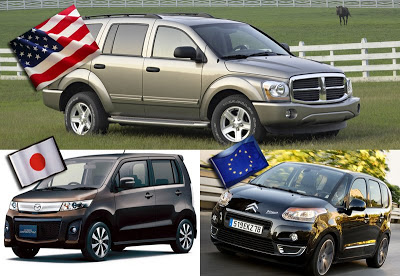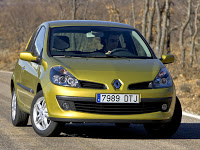JATO Study Finds Average U.S. Market Car Emits 85% More CO2 and Consumes Twice as Much Fuel as European and Japanese Market Cars
 A recent study performed by JATO Dynamics revealed something that we've already known for quite a while know: the U.S. car market is 'half' as green as its European and Japanese counterparts when it comes to CO2 emissions and fuel consumption. The analysis conceals that while American consumers haven't changed their car-buying habits, their Japanese and European counterparts are moving towards more 'eco-friendly' cars.
A recent study performed by JATO Dynamics revealed something that we've already known for quite a while know: the U.S. car market is 'half' as green as its European and Japanese counterparts when it comes to CO2 emissions and fuel consumption. The analysis conceals that while American consumers haven't changed their car-buying habits, their Japanese and European counterparts are moving towards more 'eco-friendly' cars.In Europe's 'big five' markets -France, Germany, Italy, Spain and the UK- the average CO2 emissions for new cars of all categories (including SUVs) stand at 3.26 tons/year since the beginning of 2008, based on 12,000 miles/year, representing a decrease of 0.11 tons/year from 2007. In Japan, the average CO2 emissions for new cars fell from 3.16 tons/year in 2007 to 3.10 tons/year during 2008. And the U.S.? The average new car in America emits 5.77 tons/year.
As for fuel consumption and even though JATO notes that direct comparisons between the markets is near enough impossible due to the differing test cycle, the study found that the average year-to-date figures for Cars, Minivans and SUVs in the U.S. market stand at 22.6mpg (10.6 lt/100km). That's compared to 40.3mpg in Europe (5.83 lt/ 100km) and 40.6mpg (5.79 lt/100km) in Japan.
These results are affected by the fact that a higher proportion of small cars and diesel engines influence the European CO2 average, whilst minicars account for a significant proportion (30%) of the Japanese market. In contrast, SUVs (excluding pick-ups and full-size vans) account for 30% of the total new car market in the U.S.
"Consumer green intentions are stronger than ever, but they are still voting traditionally with their wallets," says David Mitchell, President Americas at JATO. "Historic larger-vehicle tastes, relatively low gas prices and poor selection of fuel-efficient vehicles all contribute toward a slow green transition."
JATO says that in part - we'll say more than that, differences in consumer tastes can be explained by the stringent CO2-based taxation measures in place throughout Europe that haven't been enforced in the U.S. Another fact that one shouldn't ignore is of course the higher gas prices in Europe. Last time we filled up our car here in New England, we paid $2,10 a gallon - with the current exchange rates that's a mere 0,44 Euro cents a liter...
 Let me put it this way: a couple of weeks ago I visited a Ford dealership with a friend who was interested in buying a brand-new 2009 Mustang with the basic V6 engine. If he paid cash, he'd get it for around $17,000 to $18,000 (that's about €13,600).
Let me put it this way: a couple of weeks ago I visited a Ford dealership with a friend who was interested in buying a brand-new 2009 Mustang with the basic V6 engine. If he paid cash, he'd get it for around $17,000 to $18,000 (that's about €13,600).
Now, if you're in Spain for example, a Renault Clio 3d supermini with a 100HP 1.2-liter turbo engine would cost you €15,750 (around $19,800). Apparently, the same goes for vehicles in other segments.
Having lived in Europe, I can say with the utmost certainty that if I could buy a Mustang -even the V6- for a lower price than a Clio and at the same time pay 0,44 cents for a liter of gasoline, the only way you'd see me in Renault's city car would be if it was yellow and had a taxi sign on its rooftop.
 In the same way, if the U.S. government starts enforcing a CO2- or/and fuel-consumption-based taxation on new vehicles and gas prices surge to the same levels as in most European countries - above $6 or $7 a gallon- we are 110% certain that Americans will make a 180 degree turn in their buying preferences choosing compact-sized vehicles with smaller and more fuel efficient powerplants.
In the same way, if the U.S. government starts enforcing a CO2- or/and fuel-consumption-based taxation on new vehicles and gas prices surge to the same levels as in most European countries - above $6 or $7 a gallon- we are 110% certain that Americans will make a 180 degree turn in their buying preferences choosing compact-sized vehicles with smaller and more fuel efficient powerplants.
In other words, what we want to say is that in today's automotive world, when it comes to your average mainstream consumer, being 'green' is more of a necessity than a choice.
- Study Shows That New U.s. Market Vehicle's Fuel Economy Improved By 14 Percent From 2008-2012my
While President Obama’s initiative for a significant reduction in vehicles’ fuel consumption and CO2 emissions may sound very ambitious to some, a new study by the University of Michigan Transport Research Institute shows that car manufacturers...
- Toyota, Psa And Bmw Closest To Achieving Eu’s New Co2 Targets
Toyota, PSA/Peugeot-Citroen and BMW are the carmakers closest to reaching their CO2 targets next year, according to a report by market research firm JATO Dynamics. The targets are imposed by the European Union, whose objective for 2015 is to enforce...
- Study Shows That Supercar And Luxury Automakers Reduced Average Co2 Emissions In 2009
It's not only volume brands that are reducing their average CO2 performance across their fleet, so are supercar and luxury vehicle makers, according to a report by auto consultancy JATO Dynamics that compares the average CO2 output of vehicles sold...
- Eu: New Co2 Study Reveals That German Carmakers Are Off Course
A new study conducted by the European Federation of Transport and Environment shows that French, Italian and Japanese carmakers have extended their lead over German rivals last year in the race to deliver fuel efficient and low emission vehicles.. From...
- Contrary To Conspiracy Theories, Gas Mileage Is Rising
Based on preliminary sales estimates, the Transportation Department in the USofA has declared that 2007 will be a very efficient year, fuel-wise. The average fuel economy of vehicles sold in the States is likely to be the best ever, in fact. The year...
